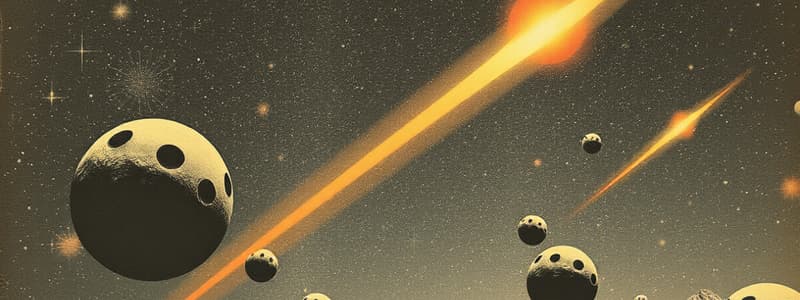Podcast
Questions and Answers
Match the following celestial bodies with their definitions:
Match the following celestial bodies with their definitions:
Asteroid = A celestial body bigger than 10 m orbiting the Sun, mainly between Mars and Jupiter Meteoroid = Similar to an asteroid, but significantly smaller. Mostly debris of comets, sometimes debris of asteroids. Meteor = A bright tail of light caused by a meteoroid during its atmospheric flight. Comet = A smaller celestial body mainly composed of ice and dust.
Match the following terms related to meteoric phenomena:
Match the following terms related to meteoric phenomena:
Fireball = A very bright meteor (brighter than the planet Venus). Bolide = A fireball that explodes during its atmospheric flight. Meteorite = The part of a meteoroid or asteroid that survives the passage through our atmosphere. Meteoroid = Mostly debris of comets, sometimes debris of asteroids.
Match the following astronomical terms with their descriptions:
Match the following astronomical terms with their descriptions:
Bolide = A fireball that explodes during its atmospheric flight. Meteor = Also called a shooting star or falling star. Asteroid = Mainly found between Mars and Jupiter. Comet = Can generate a tail of gas and/or dust when approaching the Sun.
Match the following objects with their corresponding characteristics:
Match the following objects with their corresponding characteristics:
Match the definitions with the correct terms:
Match the definitions with the correct terms:
Flashcards are hidden until you start studying
Study Notes
Celestial Bodies and Their Characteristics
- Asteroid: Large celestial objects, over 10 meters in diameter, primarily located in the asteroid belt between Mars and Jupiter.
- Meteoroid: Smaller than asteroids, these bodies are fragments of comets or asteroids, contributing to the space debris in our solar system.
Phenomena Related to Meteoroids
- Meteor: A meteoroid that enters Earth's atmosphere, creating a luminous trail; commonly known as a shooting star or falling star.
- Fireball: An exceptionally bright meteor that outshines even the planet Venus, often capturing attention due to its brilliance.
- Bolide: A type of fireball that not only shines brightly but also explodes in the atmosphere, frequently showcasing visible fragmentation.
Surviving Celestial Objects
- Meteorite: Refers to the remnants of a meteoroid or asteroid that endure the intense heat during atmospheric entry and land on Earth's surface.
- Comet: Composed mainly of ice and dust, these smaller celestial bodies can develop a tail of gas and dust when they come close to the Sun, highlighting their unique behavior in the solar system.
Studying That Suits You
Use AI to generate personalized quizzes and flashcards to suit your learning preferences.




